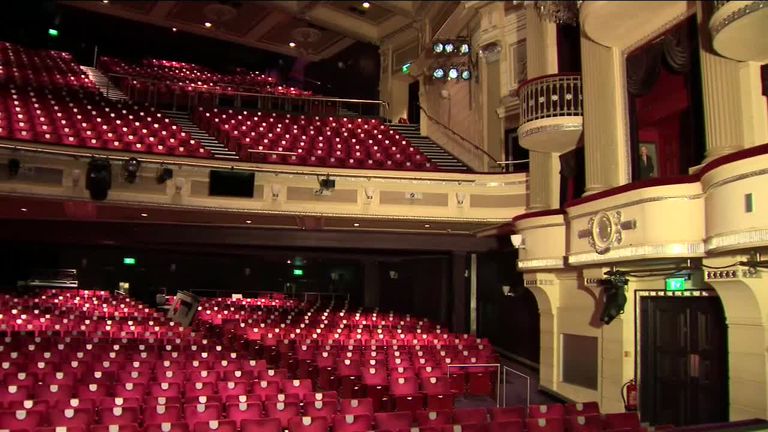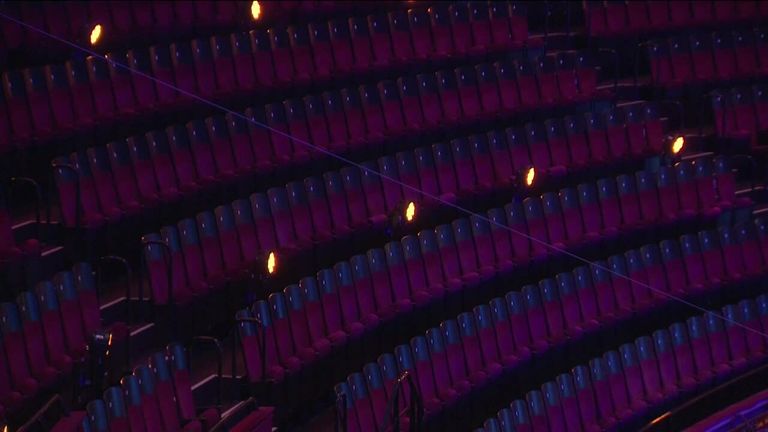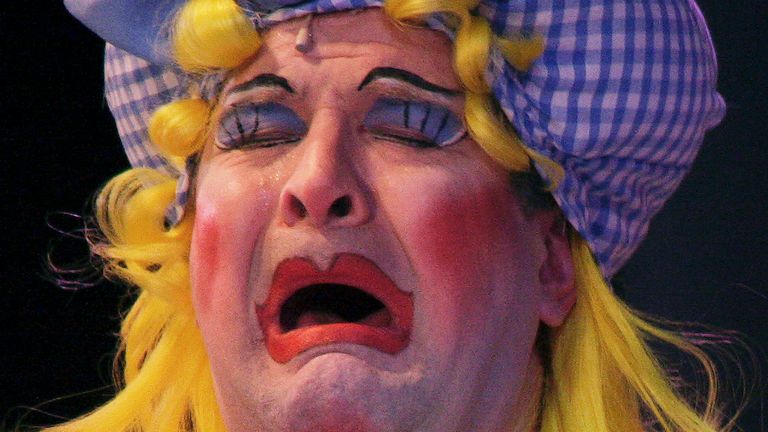The culture secretary has urged artists struggling financially during the coronavirus pandemic to “hang on in there for as long as they can”.
Oliver Dowden was speaking at the Old Vic in Bristol as he announced the latest recipients of the government’s £1.57bn Culture Recovery Fund.
Around 1,385 arts institutions in England will share £257m of grants in the biggest tranche of money awarded so far during the coronavirus pandemic.
Recipients include the Old Vic in Bristol, Yorkshire Sculpture Park in Wakefield, The London Symphony Orchestra, and Liverpool’s Cavern Club.
The arts sector has suffered significantly due to COVID-19 restrictions, with many venues closed and many creatives unable to work.
When asked if struggling artists should persevere or find other work, Mr Dowden told Sky News he hoped they “would hang on in there for as long as they can”.
The Culture Recovery Fund, overseen by the Arts Council, is aimed at institutions rather than individuals but those in the industry argue that freelancers, who are the bedrock of the sector, need more support.
Mr Dowden acknowledged it was a “desperately difficult time for the arts” and told Sky News that freelancers would benefit when places like the Old Vic get their funding – £600,000 they have been awarded for new hybrid performances.
“In doing this, it is creating job opportunities for people, so you’ll be able to employ freelancers who will provide the staging and the lighting and all these other things,” he said.
Charlotte Geeves, chief executive of the Old Vic, told Sky News that she understood the government’s rationale and was very grateful for the money they had been awarded but the sector needs more help and freelancers need more support.
“We simply can’t employ everyone at the same time. It takes time, so there is a risk that skilled people will fall out of the industry and that’s what we’re desperate to protect – not losing the diverse nature out of the industry because they can’t afford not to work,” she said.
:: Subscribe to the Daily podcast on Apple Podcasts, Google Podcasts, Spotify, Spreaker
Some 400 musicians gathered in Parliament Square this week to demand more help for freelancers. According to The Musicians’ Union, around a third have received no government support since March and the same proportion were considering leaving the profession out of necessity.
Theatres and the live events industry have also been calling for a government-backed insurance scheme, similar to the one provided to the film and TV industry, and a date for reopening without social distancing.
Mr Dowden told Sky News: “I can’t give a date with confidence”, but said he is looking at the issue ”from every angle”, including using mass testing to allow people back into theatres.
The culture secretary said he has spoken with industry heavyweights such as Andrew Lloyd Webber and Cameron Mackintosh and understood the importance of giving the certainty of a reopening date but “that certainty has to be credible”.
Down the road from the Old Vic in Bristol, The Exchange is a music venue with a capacity of 250. It has been closed since March and cannot reopen because social distancing restrictions have reduced its capacity to just 22.
Matthew Otridge, who runs the venue, told Sky News they applied for the Culture Recovery Fund but feared not every venue would be saved, with consequences for the music industry.
“I think it’s going to be oversubscribed and there are going to be a lot of venues which get left behind and there is going to be a huge knock-on effect of the whole music touring ecology.”
He said if towns were left without a music venue, it would not only limit opportunities for audiences but also for potential musicians, adding: “Some bands that could have gone on to be world beaters will simply never exist because the opportunities aren’t there”.
According to the government, the Culture Recovery Fund is aimed at safeguarding the future of cultural organisations with key national and local significance. Organisations receiving funding include:
Finborough Theatre, London – £59,574
Hallé Concerts Society, Manchester – £740,000
Royal Liverpool Philharmonic – £748,000
London Symphony Orchestra – £846,000
Wigmore Hall, London – £1m
Cavern Club, Liverpool – £525,000
National Maritime Museum Cornwall, Falmouth – £485,000
Exeter Northcott Theatre, Exeter – £183,399
Beamish Living Museum of the North – Co Durham £970,000
Royal Academy of Dance, London – £606,366
Yorkshire Sculpture Park, Wakefield £804,013
Hackney Empire, London – £585,064
Theatre by the Lake, Keswick, Lake District – £878,492
Birmingham Royal Ballet – £500,000
Bristol Old Vic Theatre – £610,466
Young Vic, London – £961,455
Storyhouse, Chester, Cheshire – £730,252
Curve, Leicester – £950,000
Lighthouse, Poole – £987,964
Wiltshire Creative– £446,968
Grimm & Co, Rotherham, Yorkshire – £86,000
Theatre Peckham, London – £150,000




